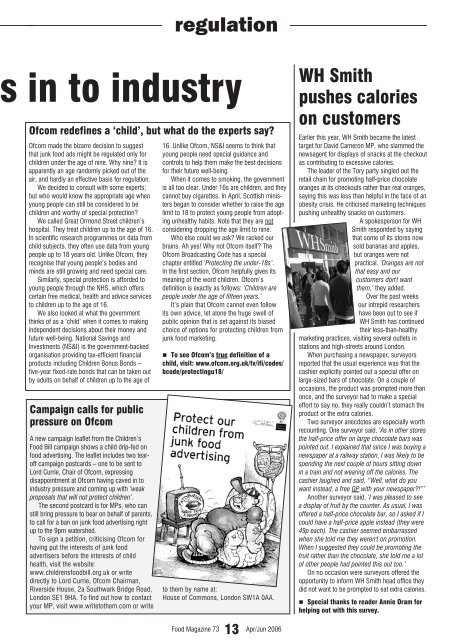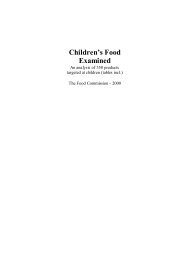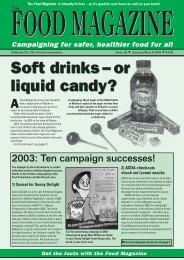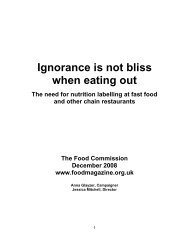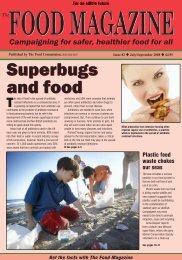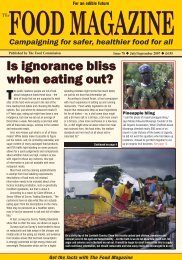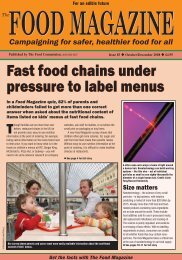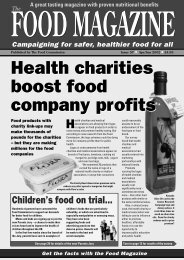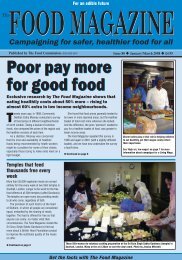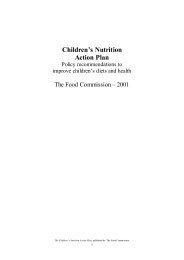Campaigning for safer, healthier food for all - The Food Commission
Campaigning for safer, healthier food for all - The Food Commission
Campaigning for safer, healthier food for all - The Food Commission
Create successful ePaper yourself
Turn your PDF publications into a flip-book with our unique Google optimized e-Paper software.
egulation<br />
s in to industry<br />
Ofcom redefines a ‘child’, but what do the experts say?<br />
Ofcom made the bizarre decision to suggest<br />
that junk <strong>food</strong> ads might be regulated only <strong>for</strong><br />
children under the age of nine. Why nine? It is<br />
apparently an age randomly picked out of the<br />
air, and hardly an effective basis <strong>for</strong> regulation.<br />
We decided to consult with some experts;<br />
but who would know the appropriate age when<br />
young people can still be considered to be<br />
children and worthy of special protection?<br />
We c<strong>all</strong>ed Great Ormond Street children’s<br />
hospital. <strong>The</strong>y treat children up to the age of 16.<br />
In scientific research programmes on data from<br />
child subjects, they often use data from young<br />
people up to 18 years old. Unlike Ofcom, they<br />
recognise that young people’s bodies and<br />
minds are still growing and need special care.<br />
Similarly, special protection is af<strong>for</strong>ded to<br />
young people through the NHS, which offers<br />
certain free medical, health and advice services<br />
to children up to the age of 16.<br />
We also looked at what the government<br />
thinks of as a ‘child’ when it comes to making<br />
independent decisions about their money and<br />
future well-being. National Savings and<br />
Investments (NS&I) is the government-backed<br />
organisation providing tax-efficient financial<br />
products including Children Bonus Bonds –<br />
five-year fixed-rate bonds that can be taken out<br />
by adults on behalf of children up to the age of<br />
Campaign c<strong>all</strong>s <strong>for</strong> public<br />
pressure on Ofcom<br />
A new campaign leaflet from the Children’s<br />
<strong>Food</strong> Bill campaign shows a child drip-fed on<br />
<strong>food</strong> advertising. <strong>The</strong> leaflet includes two tearoff<br />
campaign postcards – one to be sent to<br />
Lord Currie, Chair of Ofcom, expressing<br />
disappointment at Ofcom having caved in to<br />
industry pressure and coming up with ‘weak<br />
proposals that will not protect children’.<br />
<strong>The</strong> second postcard is <strong>for</strong> MPs, who can<br />
still bring pressure to bear on behalf of parents,<br />
to c<strong>all</strong> <strong>for</strong> a ban on junk <strong>food</strong> advertising right<br />
up to the 9pm watershed.<br />
To sign a petition, criticising Ofcom <strong>for</strong><br />
having put the interests of junk <strong>food</strong><br />
advertisers be<strong>for</strong>e the interests of child<br />
health, visit the website:<br />
www.childrens<strong>food</strong>bill.org.uk or write<br />
directly to Lord Currie, Ofcom Chairman,<br />
Riverside House, 2a Southwark Bridge Road,<br />
London SE1 9HA. To find out how to contact<br />
your MP, visit www.writetothem.com or write<br />
16. Unlike Ofcom, NS&I seems to think that<br />
young people need special guidance and<br />
controls to help them make the best decisions<br />
<strong>for</strong> their future well-being.<br />
When it comes to smoking, the government<br />
is <strong>all</strong> too clear. Under 16s are children, and they<br />
cannot buy cigarettes. In April, Scottish ministers<br />
began to consider whether to raise the age<br />
limit to 18 to protect young people from adopting<br />
unhealthy habits. Note that they are not<br />
considering dropping the age limit to nine.<br />
Who else could we ask? We racked our<br />
brains. Ah yes! Why not Ofcom itself? <strong>The</strong><br />
Ofcom Broadcasting Code has a special<br />
chapter entitled ‘Protecting the under-18s’.<br />
In the first section, Ofcom helpfully gives its<br />
meaning of the word children. Ofcom’s<br />
definition is exactly as follows: ‘Children are<br />
people under the age of fifteen years.’<br />
It’s plain that Ofcom cannot even follow<br />
its own advice, let alone the huge swell of<br />
public opinion that is set against its biased<br />
choice of options <strong>for</strong> protecting children from<br />
junk <strong>food</strong> marketing.<br />
To see Ofcom’s true definition of a<br />
child, visit: www.ofcom.org.uk/tv/ifi/codes/<br />
bcode/protectingu18/<br />
to them by name at:<br />
House of Commons, London SW1A 0AA.<br />
<strong>Food</strong> Magazine 73 13<br />
Apr/Jun 2006<br />
WH<br />
Smith<br />
pushes calories<br />
on customers<br />
Earlier this year, WH Smith became the latest<br />
target <strong>for</strong> David Cameron MP, who slammed the<br />
newsagent <strong>for</strong> displays of snacks at the checkout<br />
as contributing to excessive calories.<br />
<strong>The</strong> leader of the Tory party singled out the<br />
retail chain <strong>for</strong> promoting half-price chocolate<br />
oranges at its checkouts rather than real oranges,<br />
saying this was less than helpful in the face of an<br />
obesity crisis. He criticised marketing techniques<br />
pushing unhealthy snacks on customers.<br />
A spokesperson <strong>for</strong> WH<br />
Smith responded by saying<br />
that some of its stores now<br />
sold bananas and apples,<br />
but oranges were not<br />
practical. ‘Oranges are not<br />
that easy and our<br />
customers don't want<br />
them,’ they added.<br />
Over the past weeks<br />
our intrepid researchers<br />
have been out to see if<br />
WH Smith has continued<br />
their less-than-healthy<br />
marketing practices, visiting several outlets in<br />
stations and high-streets around London.<br />
When purchasing a newspaper, surveyors<br />
reported that the usual experience was that the<br />
cashier explicitly pointed out a special offer on<br />
large-sized bars of chocolate. On a couple of<br />
occasions, the product was prompted more than<br />
once, and the surveyor had to make a special<br />
ef<strong>for</strong>t to say no, they re<strong>all</strong>y couldn’t stomach the<br />
product or the extra calories.<br />
Two surveyor anecdotes are especi<strong>all</strong>y worth<br />
recounting. One surveyor said, ‘As in other stores<br />
the half-price offer on large chocolate bars was<br />
pointed out. I explained that since I was buying a<br />
newspaper at a railway station, I was likely to be<br />
spending the next couple of hours sitting down<br />
in a train and not wearing off the calories. <strong>The</strong><br />
cashier laughed and said, “Well, what do you<br />
want instead, a free GP with your newspaper?!”’<br />
Another surveyor said, ‘I was pleased to see<br />
a display of fruit by the counter. As usual, I was<br />
offered a half-price chocolate bar, so I asked if I<br />
could have a half-price apple instead (they were<br />
49p each). <strong>The</strong> cashier seemed embarrassed<br />
when she told me they weren't on promotion.<br />
When I suggested they could be promoting the<br />
fruit rather than the chocolate, she told me a lot<br />
of other people had pointed this out too.’<br />
On no occasion were surveyors offered the<br />
opportunity to in<strong>for</strong>m WH Smith head office they<br />
did not want to be prompted to eat extra calories.<br />
Special thanks to reader Annie Oram <strong>for</strong><br />
helping out with this survey.


